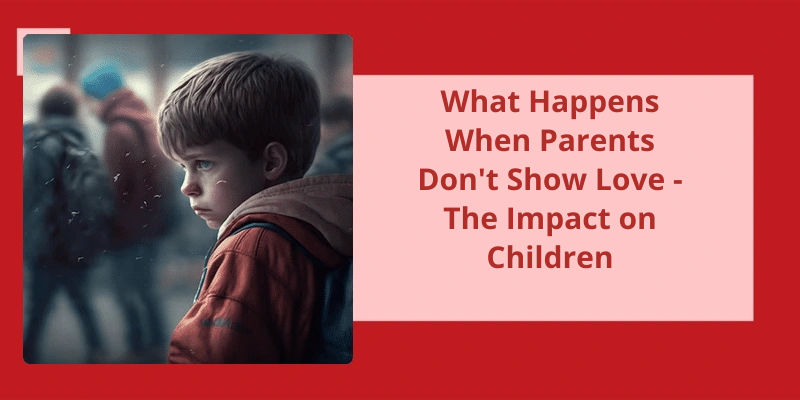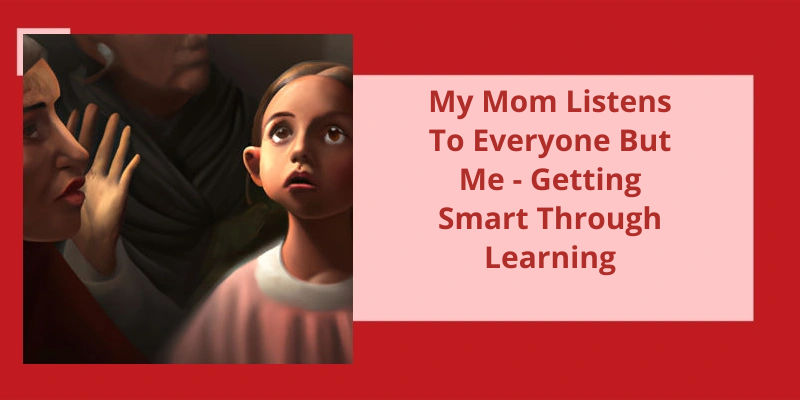The bond between a parent and child plays a crucial role in shaping the child's development and overall well-being. The love and affection a parent shows towards their child is vital in building a strong emotional connection, trust, and a sense of security. However, when parents fail to express their love or show affection towards their children, it can have significant negative impacts on the child's mental and emotional health. Research has shown that children who grow up without affectionate parents are more prone to low self-esteem, feelings of isolation, aggression, and anti-social behavior. Moreover, recent studies have also highlighted the critical relationship between parental affection and a child's success and happiness later in life.
Is It Possible That Your Parents Don’t Love You?
It’s a painful thought, but it’s one that many people have had over the years. Is it possible that your parents don’t love you? The answer, unfortunately, is yes. The truth is that not all parents are created equal, and some simply don’t have the capacity to love their children in the way that they need them to.
Of course, this is a difficult reality to face. For most of us, our parents are the people who brought us into the world and cared for us when we were young. We rely on them for emotional support, love, and guidance throughout our lives. It’s hard to imagine that they might not actually love us in return.
However, the reality is that there are many factors that can contribute to a parents inability to love their child. Sometimes it’s a result of their own upbringing – if they were raised in an environment where there was little love or affection, they may not know how to show it themselves. In other cases, it might be a result of mental illness, addiction, or other issues that make it difficult for them to form healthy relationships.
Of course, just because a parent doesn’t love their child doesn’t mean that they don’t care for them in other ways. They may still provide for their physical needs, offer financial support, and even show some level of affection. However, the absence of love can be a profound and painful experience for a child, and can have lasting effects on their mental health and well-being.
You aren’t responsible for their emotional capacity or their ability to form healthy attachments. However, it’s important to seek support and validation from others who can offer you the love and support that you deserve. This might include friends, family members, or even a therapist who can help you work through your feelings and cope with the impact of your parents lack of love.
How to Set Boundaries With Unloving Parents
- Recognize your worth and value as a person.
- Decide on the boundaries you need to set for yourself.
- Communicate your boundaries clearly and assertively.
- Be prepared for resistance and pushback.
- Stick to your boundaries and be consistent.
- Take care of yourself emotionally and physically.
- Consider seeking therapy or counseling for additional support.
The impact of a lack of parental love on a child’s emotional and psychological well-being can’t be overstated. It can manifest in various negative ways that can have long-term effects on their development, relationships, and self-esteem. Let’s explore the different forms of parental rejection and their effects on children.
What Is Lack of Parental Love?
The effects of parental rejection on children can be devastating and long-lasting. Children who lack parental love often struggle with low self-esteem, depression, anxiety, and other mental health issues. They may also have difficulty forming healthy relationships with others, and may engage in risky behaviors as a way of seeking attention and validation.
Abusive parents may physically or emotionally harm their children, or use manipulation and control as a way ofmaintaining power over them. Children who’re abused may struggle with feelings of fear, anger, and shame, and may also develop trust issues that can make it difficult for them to form healthy relationships in the future.
Parents who’re struggling with their own mental health may find it difficult to provide the love and support their children need, which can leave children feeling isolated and alone.
Source: How does a child overcome a lack of parental love?..
It’s no secret that parents want to show their children how much they love them. However, sometimes it can feel like we need to make grand gestures to express our affection. The truth is, small actions can have just as big an impact. According to Amy Morin, a psychotherapist and international bestselling author, parents can show their love through simple but meaningful gestures like writing notes, offering praise, giving high-fives, and speaking kindly about their children in public. These actions can demonstrate to a child that they’re valued and loved.
How Does a Parent Show Love to a Child?
One important way that parents can show their love to their child is by spending quality time with them. This can include doing activities together, such as going for a walk, playing a game, or reading a book. Not only does this demonstrate to the child that they’re important to the parent, it also helps to build a strong bond between them.
Parents who actively listen to their children are also demonstrating their love. When a child is trying to communicate something, it’s important for the parent to put aside distractions and really listen to what the child is saying. By doing so, the child feels heard and valued, and this can lead to increased feelings of love and trust.
Another important way that parents can show their love is by setting boundaries and enforcing rules. While this may seem counterintuitive, setting clear boundaries and expectations shows the child that the parent cares about them and their well-being. By enforcing these rules fairly and consistently, the child learns that they’re loved and supported, even when they make mistakes.
One easy way for parents to show their love is by expressing gratitude for their childs positive traits and actions. By pointing out things the child does well, the parent reinforces positive behavior and helps to build the childs self-esteem. In addition, expressing gratitude can lead to a stronger bond between parent and child.
Finally, parents can demonstrate their love by showing acceptance and unconditional support. This means accepting the child for who they are, and not trying to change them to fit a certain mold. When parents show their children that they love and accept them just the way they are, the child is more likely to feel secure and confident in themselves. This can lead to a happier and healthier relationship between parent and child.
Dealing with the pain of not being loved by your parents can be difficult, but it’s important to remember that you aren’t alone. There are ways you can find support and love from those around you, whether it be from friends, family, or even new acquaintances. It can be a process, but it’s possible to find love and acceptance outside of your family dynamic.
What to Do When Your Parents Didn T Love You?
It can be tough to come to terms with the fact that your parents didnt love you in the way that you needed and deserved. It’s natural to feel hurt, angry, and confused, and to question your own worth and value as a person. However, it’s important to remember that your parents shortcomings arent a reflection of your worth as a human being.
One of the best things you can do for yourself is to seek out supportive relationships with others who care about you. This could mean reaching out to friends you trust and spending time with them regularly, or reconnecting with other family members who can offer you love and support. Even if you don’t have biological siblings or close relatives, there may be other people in your life who can provide you with the emotional support you need.
It’s also important to be open to meeting new friends and trustworthy adults who can become important figures in your life. Remember, not every adult or caretaker will treat you the way your parents did. There are many people out there who’ve the capacity to love and care for you just as you are. Dont be afraid to give others a chance to show you kindness and support.
When youre struggling with feelings of hurt and rejection, it can be tempting to isolate yourself from others and withdraw from the world around you. However, doing so will only prolong your pain and prevent you from healing. Instead, try to stay active and engaged in the world around you. Pursue your hobbies and interests, join clubs or organizations that interest you, and try new things. You may be surprised at how much joy and fulfillment you can find by being present in the moment and experiencing all that life has to offer.
Finally, remember that it’s okay to seek professional help if youre struggling to cope with the emotional fallout of your parents lack of love and support. A skilled therapist or counselor can help you work through your feelings and develop healthy coping strategies that enable you to move forward and create the kind of life you deserve. With time, effort, and support, you can learn to heal from the wounds that your parents neglect may have caused, and build a happier, more fulfilling life for yourself.
How to Recognize and Overcome the Negative Patterns and Beliefs That Stem From Being Emotionally Neglected by Your Parents.
In order to recognize and work through negative patterns and beliefs that come from emotional neglect by parents, it’s important to identify and understand those patterns and beliefs, and then actively work to challenge and change them. This process may involve seeking support from a therapist or trusted friend, learning and practicing self-care, setting boundaries, and cultivating healthier coping mechanisms. It’s important to remember that recognizing and overcoming these patterns and beliefs is a journey that takes time and effort, but it’s possible and can lead to greater emotional well-being and fulfillment.
It’s no secret that a strong parental bond is essential in a child’s development. The love and affection that a parent provides are the building blocks necessary for a child’s healthy brain development. The effects of parental love are far-reaching and can have a significant impact on a child’s overall well-being. Let’s take a closer look at how parental love affects child development.
How Does Parental Love Affect Child Development?
Parents who provide love and affection create a sense of security and safety for their children, which helps them to form healthy emotional attachments to others. This is especially important during the early years of a childs life, when their brains are still developing and forming connections. Studies have shown that children who receive consistent love and affection from their parents have lower levels of anxiety and depression later in life.
This may be due to the fact that children who feel secure and loved are more likely to explore and learn about their environment. Loving parents also tend to be more supportive of their childrens education, which can positively impact academic achievement.
Parental love can also have a significant impact on a childs physical health. Research has shown that children who experience high levels of stress in their early years are more likely to develop chronic health conditions, such as heart disease and diabetes, later in life. However, children who receive love and affection from their parents are better equipped to cope with stressors and have a lower risk of developing these health issues.
The way parents respond to their childrens emotional needs influences their ability to form healthy relationships, regulate their own emotions, and achieve academic success. It also plays an important role in their physical health and well-being. As a society, it’s important that we value and support parents as they raise the next generation of healthy, happy adults.
When it comes to dealing with parents who don’t care about your feelings, it can be a challenging and emotional situation to navigate. However, there are ways to handle the situation that can help you address your feelings while still caring for your parents. Here are five ways to approach the situation and find the support you need.
How to Deal With Parents Who Don T Care About Your Feelings?
Growing up, we often hear about how important it’s to respect our elders, especially our parents. We’re taught to assume that our parents always have our best interests at heart and that they’ll always support us. However, not all of us are lucky enough to have parents who care about our feelings. This can lead to a lot of complicated emotional issues that aren’t easy to work through. Here are five ways to handle the situation when caring for parents who didn’t care for you.
The first thing you need to do is to get help working through your complicated feelings. It can be incredibly difficult to come to terms with the fact that your parents don’t care about your feelings. You may feel abandoned, angry, and hurt. That’s why it’s important to find someone to talk to. This could be a close friend, a therapist, or even a support group. They can help you sort through your emotions and come up with healthy ways to cope.
The next step is to stay involved in your parents” lives, but hire a professional to manage their care. One option is to hire a professional caregiver to handle their needs. This allows you to be involved in their lives without having to deal with the emotional strain of caring for them yourself.
It’s also helpful to get support from others in similar situations. Many people are going through the same thing. Reach out to online support groups or local organizations that offer support for caregivers. You”ll be able to connect with people who understand what you’re going through and who can offer guidance and support.
Reading books that offer helpful advice is another way to cope with the situation. There are many books available that deal with caring for elderly parents or dealing with difficult family dynamics. These books can be incredibly helpful in providing you with coping mechanisms and strategies for working through your emotions.
Finally, it’s important to set boundaries. This means being clear about what you’re willing and not willing to do, and standing firm when your boundaries are crossed.
It’s important to get support from others, work through your emotions with a professional, stay involved in your parents” lives, read helpful books, and set boundaries. By taking these steps, you can better navigate this difficult situation and find a path forward. Remember, you aren’t alone, and there’s help available.
Communication Skills: How to Communicate With Parents Who Don’t Care About Your Feelings and How to Express Your Own Feelings Effectively.
This article provides tips on how to effectively communicate with parents who may not be considerate of your emotions and also focuses on developing your own communication skills to express your feelings in an effective manner.
Conclusion
In essence, the impact of parental love on a child's well-being can’t be overstated. It shapes their emotional, physical, and social development, and has far-reaching implications for their future success in life. However, the lack of parental affection can lead to serious consequences, affecting not just the child's individual growth, but also society at large. It’s high time that we recognize the importance of parental love and affection in building a better future for our children, and take steps to ensure that all children receive the nurturing they need to thrive.






